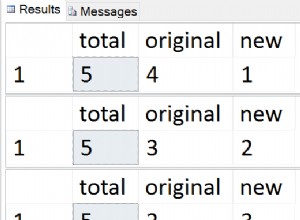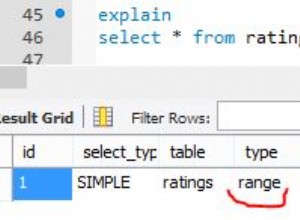Primo passaggio:eseguire la pre-aggregazione nella sottoquery:
EXPLAIN
SELECT cal.theday, act.action_name, SUM(sub.the_count)
FROM generate_series(current_date - interval '1 week', now(), interval '1
day') as cal(theday) -- calendar pseudo-table
CROSS JOIN (VALUES
('page_open')
, ('product_add') , ('product_buy') , ('product_event')
, ('product_favourite') , ('product_open') , ('product_share') , ('session_start')
) AS act(action_name)
LEFT JOIN (
SELECT es.action_name, date_trunc('day',es.date_update) as theday
, COUNT(DISTINCT es.id ) AS the_count
FROM event_statistics as es
WHERE es.client_id = (SELECT c.id FROM clients AS c
WHERE c.client_name = 'client name')
AND (es.date_update BETWEEN (current_date - interval '1 week') AND now())
GROUP BY 1,2
) sub ON cal.theday = sub.theday AND act.action_name = sub.action_name
GROUP BY act.action_name,cal.theday
ORDER BY act.action_name,cal.theday
;
Passaggio successivo:inserisci VALUES in un CTE e fai riferimento ad esso anche nella subquery aggregata.(il guadagno dipende dal numero di nomi di azioni che possono essere saltati)
EXPLAIN
WITH act(action_name) AS (VALUES
('page_open')
, ('product_add') , ('product_buy') , ('product_event')
, ('product_favourite') , ('product_open') , ('product_share') , ('session_start')
)
SELECT cal.theday, act.action_name, SUM(sub.the_count)
FROM generate_series(current_date - interval '1 week', now(), interval '1day') AS cal(theday)
CROSS JOIN act
LEFT JOIN (
SELECT es.action_name, date_trunc('day',es.date_update) AS theday
, COUNT(DISTINCT es.id ) AS the_count
FROM event_statistics AS es
WHERE es.date_update BETWEEN (current_date - interval '1 week') AND now()
AND EXISTS (SELECT * FROM clients cli WHERE cli.id= es.client_id AND cli.client_name = 'client name')
AND EXISTS (SELECT * FROM act WHERE act.action_name = es.action_name)
GROUP BY 1,2
) sub ON cal.theday = sub.theday AND act.action_name = sub.action_name
GROUP BY act.action_name,cal.theday
ORDER BY act.action_name,cal.theday
;
AGGIORNAMENTO:utilizzando una tabella fisica (temporanea) si ottengono stime migliori.
-- Final attempt: materialize the carthesian product (timeseries*action_name)
-- into a temp table
CREATE TEMP TABLE grid AS
(SELECT act.action_name, cal.theday
FROM generate_series(current_date - interval '1 week', now(), interval '1 day')
AS cal(theday)
CROSS JOIN
(VALUES ('page_open')
, ('product_add') , ('product_buy') , ('product_event')
, ('product_favourite') , ('product_open') , ('product_share') , ('session_start')
) act(action_name)
);
CREATE UNIQUE INDEX ON grid(action_name, theday);
-- Index will force statistics to be collected
-- ,and will generate better estimates for the numbers of rows
CREATE INDEX iii ON event_statistics (action_name, date_update ) ;
VACUUM ANALYZE grid;
VACUUM ANALYZE event_statistics;
EXPLAIN
SELECT grid.action_name, grid.theday, SUM(sub.the_count) AS the_count
FROM grid
LEFT JOIN (
SELECT es.action_name, date_trunc('day',es.date_update) AS theday
, COUNT(*) AS the_count
FROM event_statistics AS es
WHERE es.date_update BETWEEN (current_date - interval '1 week') AND now()
AND EXISTS (SELECT * FROM clients cli WHERE cli.id= es.client_id AND cli.client_name = 'client name')
-- AND EXISTS (SELECT * FROM grid WHERE grid.action_name = es.action_name)
GROUP BY 1,2
ORDER BY 1,2 --nonsense!
) sub ON grid.theday = sub.theday AND grid.action_name = sub.action_name
GROUP BY grid.action_name,grid.theday
ORDER BY grid.action_name,grid.theday
;
Aggiornamento n. 3 (scusate, creo gli indici sulle tabelle di base qui, dovrai modificare. Ho anche rimosso le colonne singole sul timestamp)
-- attempt#4:
-- - materialize the carthesian product (timeseries*action_name)
-- - sanitize date interval -logic
CREATE TEMP TABLE grid AS
(SELECT act.action_name, cal.theday::date
FROM generate_series(current_date - interval '1 week', now(), interval '1 day')
AS cal(theday)
CROSS JOIN
(VALUES ('page_open')
, ('product_add') , ('product_buy') , ('product_event')
, ('product_favourite') , ('product_open') , ('product_share') , ('session_start')
) act(action_name)
);
-- Index will force statistics to be collected
-- ,and will generate better estimates for the numbers of rows
-- CREATE UNIQUE INDEX ON grid(action_name, theday);
-- CREATE INDEX iii ON event_statistics (action_name, date_update ) ;
CREATE UNIQUE INDEX ON grid(theday, action_name);
CREATE INDEX iii ON event_statistics (date_update, action_name) ;
VACUUM ANALYZE grid;
VACUUM ANALYZE event_statistics;
EXPLAIN
SELECT gr.action_name, gr.theday
, COUNT(*) AS the_count
FROM grid gr
LEFT JOIN event_statistics AS es
ON es.action_name = gr.action_name
AND date_trunc('day',es.date_update)::date = gr.theday
AND es.date_update BETWEEN (current_date - interval '1 week') AND current_date
JOIN clients cli ON cli.id= es.client_id AND cli.client_name = 'client name'
GROUP BY gr.action_name,gr.theday
ORDER BY 1,2
;
QUERY PLAN
----------------------------------------------------------------------------------------------------------------------------------------------------------
GroupAggregate (cost=8.33..8.35 rows=1 width=17)
Group Key: gr.action_name, gr.theday
-> Sort (cost=8.33..8.34 rows=1 width=17)
Sort Key: gr.action_name, gr.theday
-> Nested Loop (cost=1.40..8.33 rows=1 width=17)
-> Nested Loop (cost=1.31..7.78 rows=1 width=40)
Join Filter: (es.client_id = cli.id)
-> Index Scan using clients_client_name_key on clients cli (cost=0.09..2.30 rows=1 width=4)
Index Cond: (client_name = 'client name'::text)
-> Bitmap Heap Scan on event_statistics es (cost=1.22..5.45 rows=5 width=44)
Recheck Cond: ((date_update >= (('now'::cstring)::date - '7 days'::interval)) AND (date_update <= ('now'::cstring)::date))
-> Bitmap Index Scan on iii (cost=0.00..1.22 rows=5 width=0)
Index Cond: ((date_update >= (('now'::cstring)::date - '7 days'::interval)) AND (date_update <= ('now'::cstring)::date))
-> Index Only Scan using grid_theday_action_name_idx on grid gr (cost=0.09..0.54 rows=1 width=17)
Index Cond: ((theday = (date_trunc('day'::text, es.date_update))::date) AND (action_name = es.action_name))
(15 rows)




